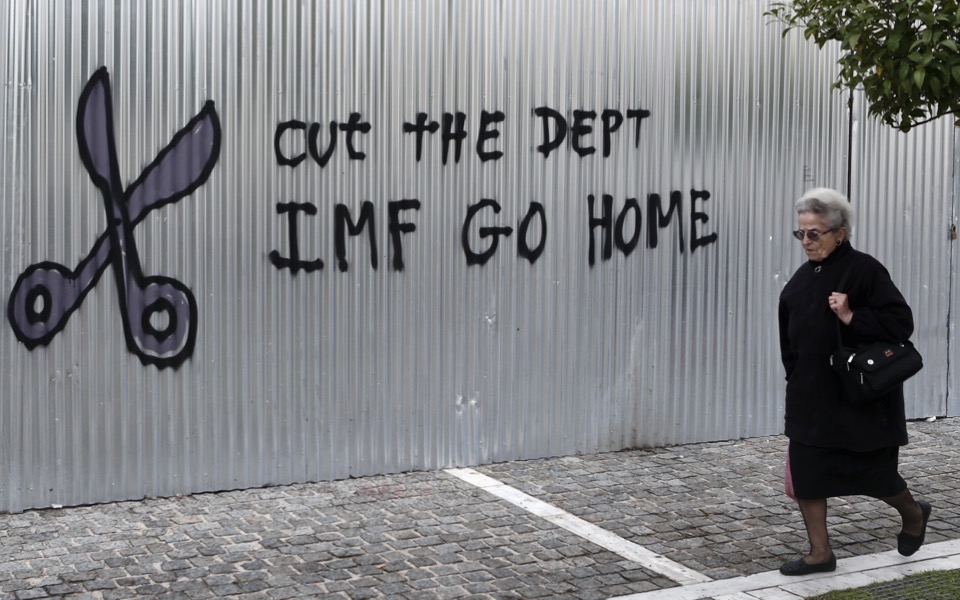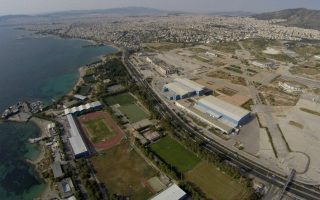Athens’ thorny bailout marriage with the IMF

It was April 17, 2010, and Iceland’s Eyjafjallajokull had just erupted, sending out great big ash clouds that were causing widespread air traffic disruption in parts of Europe.
In Athens, the Greek government was anxiously preparing for the first visit by its creditors’ mission chiefs – if they didn’t sign off on a loan, Greece would go bankrupt in a month. Time was of the essence, so the European Commission and the European Central Bank teams had to make the journey from Brussels by bus. The only official who made it in time for the scheduled meeting was International Monetary Fund mission chief Poul Thomsen, who flew in from Washington.
This incident may have been a harbinger of the central role the Danish economist would go on to play in economic as well as political developments in Greece over the next decade, in a chapter of history that came to an end with Greek Prime Minister Kyriakos Mitsotakis’ announcement of the closure of the IMF office in Athens last month.
Thomsen was born in a small Danish town near the German border in 1955. He studied economics at the University of Copenhagen and was almost turned down when he applied to the IMF because he didn’t have a PhD. But by the time the Greek crisis erupted, he had been with the Fund for 30 years and had also been in charge of Iceland’s bailout in 2008, making him the right man for the Greek job. Ambitious and hardworking, and known among his colleagues as the “crisis guy,” Thomsen was more in his element in countries on the brink of an economic collapse than at IMF meetings in Washington.
For the Fund’s chief at the time, French economist Dominique Strauss-Kahn, participating in the rescue of a European Union member-state was important. He knew that the IMF’s reputation was at stake if it didn’t help stop the spread of the crisis in the eurozone. German Chancellor Angela Merkel was also convinced that the Fund needed to be part of the solution by offering its know-how.
“The truth is that most of us were unaware of how unprepared Europe was for such an undertaking,” remembers Thomas Wieser, the former president of Eurogroup Working Group (EWG) and main architect of the eurozone rescue programs.
In the first few times they all sat down together, the members of the Greece missions viewed Thomsen as fair and reasonable – perhaps even more so than his European colleagues – and as having more realistic targets in mind. “He managed to get the deficit target down from 13 percent in 2010 to 3 percent over five instead of four years as had been originally agreed,” recalls Greece’s finance minister at the time, George Papaconstantinou.
The first performance review was completed in the summer of 2010 within the given timeline and the institutions appeared pleased by the Greek authorities’ response. The IMF board, however, was concerned that the country’s debt was not really sustainable – one of the main conditions for the Fund’s participation – and kept the pressure up. What was evident was that the Greeks would have to adhere to a strict plan in order to convince the markets that the country was on the road to recovery. Initial predictions soon proved much too optimistic.
A few months later, Merkel and French President Nicolas Sarkozy announced that any future bailouts would henceforth include a “haircut” on privately held debt. The markets, somewhat buoyed by the successful completion of Greece’s first review, shied at the news. Creditor representatives remember the pressure the Greek government came under to make a big gesture that would impress the markets, at Thomsen’s insistence. Shortly after, the Fund announced that Greece would privatize 50 billion euros’ worth of state assets. The target soon proved untenable, dealing a blow to Thomsen’s credibility.
‘Immoral’ practices
The election of Antonis Samaras as prime minister in June 2012 signaled the start of a period of intense tension between Thomsen and the Greek government, but also the European Commission. By then, the Europeans had acquired the know-how to run the program on their own and had become skeptical of the IMF’s policy recipes, but a lack of confidence in the European institutions on the part of countries including Germany and the Netherlands made the Fund’s departure impossible, strengthening Thomsen’s position.
A row between the representatives of the institutions would precede almost every single meeting with their Greek partners, as the Europeans had much more optimistic projections of the country’s fiscal performance and cited the progress it saw as proof. “There were two phases in each negotiation: one with the Europeans and the other with the Greeks,” says an IMF official who declined to be named.
Thomsen, meanwhile, had come to realize that Berlin was the real force behind the Eurogroup and traveled to Germany on several occasions, often secretly, in order to strengthen his relationship with then finance minister Wolfgang Schaeuble. His tough stance toward Greece soon won over the German official and the two men embarked on a mutually beneficial relationship. The IMF seal of approval allowed Schaeuble to pass decisions related to the Greek program in the Bundestag, while Thomsen enjoyed the support of the eurozone’s most powerful minister. What seems to have united the two men was a mutually profound suspicion of Greece’s ability to reform.
The Danish economist’s skepticism stemmed from the fact that he had seen how legislating and implementing reforms were two entirely different things in Greece. Laws may have been passed in Parliament, but vested interests always found a loophole that would allow them to carry on as usual. Privatizations were beset by delays, closed-shop professions remained inaccessible, tax amnesties continued, and so on and so forth.
Thomsen’s insistence on public sector layoffs was the main thorn in his relationship with the Greek government. He believed that the threat of dismissal would make civil servants more efficient. But as the Greek Constitution prohibited across-the-board layoffs, Thomsen demanded that entire organizations be shut down so that the country could reach its targets. The Fund official admits that Thomsen employed one of the IMF’s toughest negotiation tactics: Propose something extreme that you really don’t care about, so that you can trade it later or use it as leverage against the other side. Some people at the Fund “thought this practice immoral, but Thomsen was prepared to use it,” says the official.
Under tremendous pressure, the Greek government closed down state broadcaster ERT in June 2013, a decision that prompted the departure of the Democratic Left from the three-party government and threatened the coalition. “Thomsen’s technocratic hegemony had become a technocratic obsession. His insistence on layoffs was a waste of the reformist momentum, and that over a taboo issue that had no real added value,” notes Stavros Papastavrou, one of the main negotiators of the Samaras government, who had clashed fiercely with the IMF mission chief. Public sector layoffs were not tabled again during the negotiations after ERT’s closure.
Greece’s finances had started showing clear signs of improvement by mid-2013, yet Thomsen “became even tougher and more pessimistic in his predictions,” according to former finance minister Yannis Stournaras. The explanation some give is that the IMF had started to lose its starring role in the Greek program.
The Grexit threat
The European Commission changed presidents three times over the course of Thomsen’s presence in Greece. Some of the Danish economist’s colleagues say that he got too deeply involved in the Greek program and became obsessed with certain reforms, particularly social security and labor reform. His attitude also seemed to anger regular Greeks to the extent that he was assailed outside the Finance Ministry in downtown Athens one day by a man who threw coins and hurled abuse at him. “Why do they hate me instead of the Europeans?” he reportedly asked his colleagues, while many describe him as being particularly sensitive to criticism.
In April 2014 Greece made its first foray into the markets since the start of the crisis; its deficit had shrunk from 8.9 percent in the summer of 2012 to 3.6 percent, while an economic contraction of 9.1 percent had been transformed into growth of 0.7 percent. A performance review that had dragged on for five months was finally wrapped up, but left indelible scars on the relationship between Athens and the IMF.
That was when Thomsen started discussing the possibility of a Greek exit from the euro at the Fund. “This country cannot be reformed,” he is remembered as saying. “Perhaps it’s best if it leaves the euro,” he said, arguing that the Greek political system was corrupt and that clientelist ties were too deeply entrenched to change.
The resignation of Haris Theocharis from the role of general secretary for public revenues in June 2014 was instrumental in strengthening Thomsen’s claims about Greece and the government’s unwillingness to clash with vested interests and combat corruption.
The crucial review
Samaras knew that he had one more review to complete the program and just enough time to elect a Greek president. “We’re going to wrap this one up fast,” he told the institutions in the summer of 2014. He hadn’t accounted for the reform fatigue besetting the government, or for the IMF’s total lack of understanding for his need for haste.
Even though Thomsen was promoted in July to head the Fund’s European department, his successor as mission chief for Greece, Rishi Goyal, was everything he could wish for, according to people who knew both well: a detail-oriented technocrat who would play the role of bad cop and who wanted the IMF to maintain its unyielding stance. He is also said to have believed that Greece did not belong in the eurozone. Thomsen may no longer have been in the room, but his presence was stronger than ever.
The evaluation of Greece’s progress not only failed to finish fast; it was never completed. On the one hand, Thomsen said there was no reason for him to return to Athens, as Greece had completed just one of the 14 structural reforms demanded to complete the review. On the other, the Greeks and the Europeans insisted that the differences between the two sides were slight and could be bridged.
The same IMF official tells Kathimerini that the Fund avoided making specific proposals of what it wanted from the Greeks to restart the negotiations, while the Greek government was too slow to show that it was ready to adopt the painful measures needed to wrap up the review. By December 2014, the difference in the calculations of the two sides had shrunk to just 1.6 billion euros, but the IMF officials still refused to come to Athens for talks, despite the pleas of the Greek government.
Desperate for a solution, Samaras had called US Treasury Secretary Jack Lew in late November 2014 and asked him to intervene so that negotiations with the Fund could restart. The biggest problem, he learned, was an absence of trust in the Greek government, as Thomsen believed that Samaras had lost the ability to continue with the reforms. “Thomsen gave me the impression that his problem with Greece had become personal,” one US official remembers.
The Greek presidential election was just three months away by then and without anything to show, Samaras was unable to combat leftist SYRIZA leader Alexis Tsipras’ rising popularity. The political landscape in Greece was changing rapidly, as a SYRIZA government grew increasingly likely. For Thomsen, the situation was clear: Why should he throw a lifeline to a government that seemed to be on the way out? Completion of the review would see Greece receive 7.2 billion euros, which would mean that Tsipras would find state coffers full and be able to fulfill some of his anti-memorandum promises.
The best Thomsen could do was wait and see how political developments would pan out. In doing so, he undermined the efforts of the Samaras government and of the European Commission, which was eager to bridge the differences between the parties. “Thomsen probably saw SYRIZA’s election as a social experiment, wondering what would happen if a radical left-wing party came to power,” said one European official who declined to be named.
SYRIZA was elected in January 2015. The IMF’s stance, however, remained equally perplexing in the first months of talks. “They kept changing the targets we had to reach,” says a member of SYRIZA’s negotiation team at the time. “It was as if they didn’t want a breakthrough,” he adds, noting that the lack of trust was palpable.
In the runup to the July 5, 2015 referendum, Greece became the first developed nation in the IMF’s 72-year history to renege on its commitments. On June 30, it joined the category of countries that had failed to pay their debt to the Fund, alongside Zimbabwe, Sudan and Somalia. The IMF made a surprise and controversial move just as the pre-referendum campaigns were in full swing, publishing an analysis of the country’s debt sustainability and showing that Greece was in desperate need of a writedown just three days before Greeks headed to the polls. The IMF had long argued in favor of lightening the country’s debt pile, but the move to publish such an explosive document at such a crucial moment was regarded with some suspicion even by the most cynical EU officials. IMF officials justify the decision as having been obligatory.
The relationship between the IMF and Athens changed after the referendum and after Goyal was succeeded by Delia Velculescu as mission chief. The Romanian economist was instrumental in unblocking the negotiations and achieving a deal in July 2015, one Greek official remembers. The thaw, however, did not last long.
Indeed, by 2017 the Greek side felt that the IMF had lost interest in the country. The truth is that from the summer of 2014 to the end of the program in 2018, the IMF had not disbursed a single euro to Greece, yet it continued to play an active role in the program.
“This was quite an achievement and is mainly credited to Thomsen, who is as brilliant as he is Machiavellian,” says another European official on condition of anonymity.
Poul Thomsen declined numerous requests by Kathimerini for comment.





